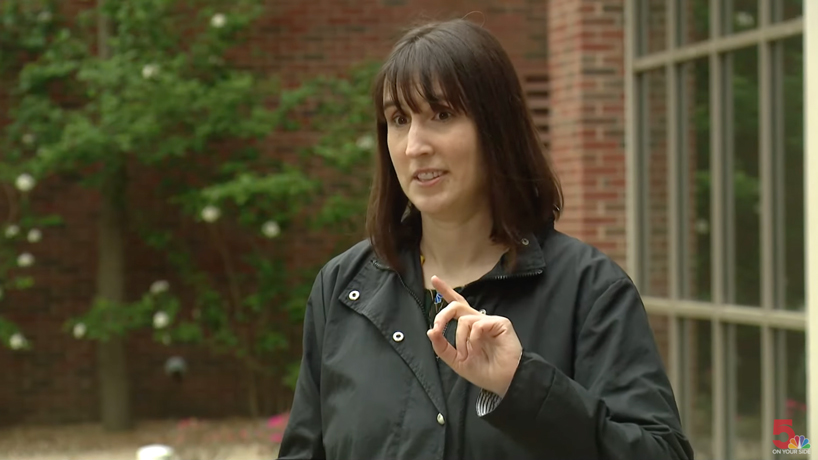
Assistant Professor Chelsey Wilks, a clinical psychologist who studies suicide prevention, spoke to KSDK (Channel 5) about fears of a “post-pandemic boomerang effect” leading to more suicides after a period of decline. (Screenshot)
The United States has observed May as Mental Health Awareness Month since 1949, and it’s meant to be a time to raise awareness of people living with mental or behavioral health issues and reduce the stigma they encounter.
The University of Missouri–St. Louis trains students in psychological and behavioral health and offers a number of services that assist people on campus and across the wider St. Louis region. It’s, therefore, no surprise that UMSL faculty members would be called upon to share their expertise during the monthlong observance.
Last week, KSDK (Channel 5) interviewed Assistant Professor Chelsey Wilks, a clinical psychologist who studies suicide prevention, for a story about a St. Louis County teenager who died by suicide in February after experiencing bullying.
“I work with a lot of people at suicide hotlines, and they’re saying calls are up, parents who are distressed are up and they’re seeing a lot of signs that things are going to get really, really bad,” Wilks told KSDK. “Particularly with elementary, middle school, high school and college students. Everybody is pretty nervous right now in the suicide community.”
A report from Mental Health America, citing data from the Substance Abuse and Mental Health Services Administration, said that 10.6% of youth – more than 2.5 million youth in the United States – cope with severe major depression. More than half of those individuals go without treatment.
So while data from the Centers for Disease Control and Prevention showed a decline in suicide in 2019 and 2020, Wilks expects those numbers to increase.
“I’m on a couple local and state-wide suicide coalitions, and we are all just pretty anxious right now,” Wilks told KSDK. “We could see a post-pandemic boomerang effect.”
Adolescents are far from the only people who experience struggles with mental health.
Professor Ann Steffen, like Wilks, is a clinical psychologist in the Department of Psychological Sciences at UMSL, and her research, teaching and clinical interests are in geropsychology and behavioral medicine. Her research lab aims to advance understanding of best practices for training behavioral health clinicians to work with older adults.
Steffen earlier this month penned an article for the National Council on Aging titled “Helping Mental Health Professionals Treat Older Adults.”
“Because generalist clinicians along with aging specialists come from such a wide range of disciplines – including clinical and counseling psychology, marriage and family therapists, nursing, occupational therapy, psychiatry and social work – it can be challenging for providers to know where to go for state-of-the-art and state-of-the-science professional training and clinical resources,” Steffen wrote.
Steffen offers some ideas on where clinicians can go to find trainings and discusses some age-related adaptations they can implement for individual and group psychotherapy to better serve older patients dealing with depression or other mental health problems.
She also describes how behavioral activation can help address depression in older adults.
“Most depressed older adults significantly reduce their frequency of engagement in everyday positive activities due to feeling down and uninvolved in life,” Steffen wrote. “These decreases in the frequency of positive activities play especially strong roles in perpetuating depressive symptoms in middle-aged and older adults. For that reason, increasing daily rewarding, meaningful and valued activities is a priority in treatment for depression.”
Clinicians can play an important role helping their patients figure out how to get started doing rewarding and meaningful activities.
Here is a list of UMSL-connected centers that support mental and behavioral health:
- The Center for Trauma Recovery is a multi-disciplinary center whose purpose is to foster research, graduate and undergraduate education and service in the areas of trauma and victimization.
- Children’s Advocacy Services of Greater St. Louis is a university-based, multidisciplinary center that provides high-quality trauma-focused services to youth, families and the community. It promotes resiliency, physical safety, and emotional stability through comprehensive research, forensic and clinical services, and educational and advocacy programming.
- The Community Psychological Service is a not-for-profit outpatient mental health center established to provide psychological services to residents of the St. Louis metropolitan area. It provides high quality, affordable counseling and evaluation services to adults, couples, children and families. The center is based at Stadler Hall and is affiliated with the Center for Behavioral Health, which has offices in West St. Louis County and in Franklin County.
- Counseling Services assists students, staff and faculty to define and accomplish their personal and academic goals through counseling, consultation, educational outreach programs, teaching and training. It has tailors services to the needs of a culturally diverse campus population.
- The Counseling and Social Advocacy Center assists individuals, couples and families in need of counseling services with affordable counseling provided by professional counselors and graduate counseling students. The center is operated through the Counseling Program in UMSL’s College of Education.
- The Missouri Institute of Mental Health partners with governmental agencies, human service organizations and research teams in an effort to improve lives through the promotion of mental health via research, evaluation, professional training, program development and community outreach.














